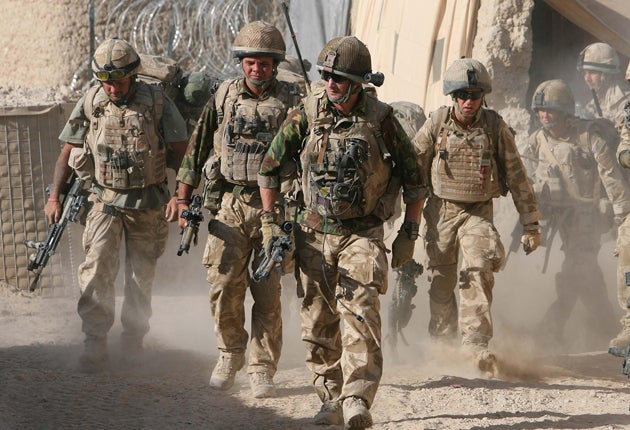Tories attacked over plan to divert aid funds to military
Charities say creation of 'stabilisation force' may put relief workers at risk

A future Conservative government would set up a new military stablisation force funded from money diverted from the international aid budget, it emerged yesterday.
The move came under immediate criticism from aid agencies who said it would undermine development projects and put relief workers at risk in volatile areas by identifying them too closely with the military.
The new policy also appeared to have caused serious friction within the shadow Cabinet with the Tory shadow international development secretary failing to appear at its central London launch. Mr Cameron claimed this was because Andrew Mitchell was in the Midlands, but, after Mr Mitchell was spotted at Westminster, the Conservative leader's office was forced to issue a second version of events involving trips being cancelled at the last minute.
A Conservative strategy paper also states that the Foreign and Commonwealth Office and Department for International Development should work on a "shared agenda", a pledge which has been interpreted as the FCO taking a more dominant role over Dfid. Mr Cameron said yesterday that the Dfid would continue as an independent ministry but it is widely believed that its influence, which had grown under Labour, would be cut under the Tories.
Dame Pauline Neville-Jones raised the option, later confirmed by Mr Cameron, of moving Dfid money to military projects. The Tory leader said his party would abide by Organisation for Economic Co-operation and Development rules when matching 0.7 per cent in aid commitments, but insisted there was no reason why some of the money should not go on defence operations.
David Mepham, Save the Children's Director of Policy said: "There is an urgent need for the Conservatives to clarify that the purpose of development aid is poverty reduction, not subsidising military operations.
"Save the Children is very concerned that the Conservatives' security spokesperson on BBC Radio 4's Today programme this morning left open the possibility of significant aid funds being diverted into stabilisation units. This dangerously muddles up security and development goals, increasing the risks facing development and humanitarian workers in conflict situations."
Kirsty Hughes, Oxfam Head of Policy, said: "Removing aid and using it for military goals would be a big step backwards and undermine the UK's leadership on international development."
The Conservatives also announced plans yesterday to set up a permanent military command centre to deal instantly with natural disasters such as major floods. It could also act in the event of a major terrorist attack.
Soldiers would be deployed more rapidly on to the streets. The command centre would also co-ordinate rescue efforts by the emergency services, ensure power and phone links are restored as quickly as possible and oversee moves to get food and water to a stricken area. In addition, a Cameron government would also establish a Cyber Threat and Assessment Centre to protect computer systems against massive attack from foreign hackers.
Last night Mr Mitchell said there was no significance in his absence from the policy launch. He said: "Nothing should be read into this; we're a thin blue line and spread ourselves around."
The Independent revealed last year that after the Mumbai terror attacks, MPs were considering recommending the setting up of a homeland security force. Patrick Mercer, chair of the Commons Counter-Terrorism Sub- committee, said: "Events in Mumbai demonstrate the urgency of such a review."
At present, one squadron of the SAS, about 80 men, known as the Special Projects Team, is on standby in Hereford. This squadron, however, is believed to be below full strength. Police armed response units also carry out continuous patrols to deploy during an emergency. Additional forces would be called in during a prolonged operation or a siege situation.
Mr Cameron pledged that should he form a government, it would not take recourse to a "dodgy dossier" of WMD threats, as used by Tony Blair to justify the Iraq invasion, in sending troops for military operations abroad. "It's made people suspicious of something they should be able to rely on," he said.
"Political advisers will not be permitted to change intelligence assessments, and any publication of an assessment should only be done by the Joint Intelligence Committee, with the express clearance and approval of the JIC."
Join our commenting forum
Join thought-provoking conversations, follow other Independent readers and see their replies
Comments